| |
|
Products and Publications
SERVE develops, publishes, and distributes a variety of research-based studies, training materials, policy briefs, brochures, and videotapes and DVDs. These informative products and publications are guides to available resources, current issues in education policy, and examples of exemplary educational programs. SERVE offers publications in the following topic areas.
|
|
|
|
Publications listed in alphabetical ordered by title
| A Call to Action: Family Involvement as a Critical Component of Teacher Education Programs 1998 |
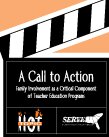
|
| The need for effective family involvement in the entire education process of each child has never been more crucial than it is today. Most teachers are not as equipped to handle the needs of today's children and families as they could be. Universities and community colleges need help as they strive to enhance their preparation programs. This report highlights the need for preparation programs in early childhood education to do more to help teachers and caregivers involve families in school or center life. It addresses the fundamental skills that early childhood educators should have to more fully involve families in their young children's lives at school and in the childcare center. Recommendations for creating more effective preservice and inservice programs are offered in this report, along with ideas for programs that work. |
| |
|
| A Facilitator's Guide to Professional Learning Teams: Creating On-the-job Opportunities for Teachers to Learn and Grow 2005 |
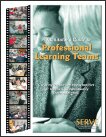
|
| Professional development research suggests that teachers learn best from and with each other in ongoing, job-embedded activities. A Facilitators Guide to Professional Learning Teams provides a way of engaging school faculties in sustained, onsite professional development that builds capacity and collegiality, improves teaching quality, and focuses on student achievement. This practical how-to guide will provide facilitators with field-tested tools and procedures for establishing and maintaining professional learning teams in schools. (A sample of Chapter 1) |
| |
|
| A Parent's Guide to Class Size Reduction 2003 |
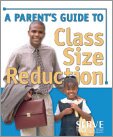
|
| Reducing the number of students in a class, especially in the early grades, is one approach educators have taken to improve student achievement. Class size reduction programs have been implemented at the state, district, and individual school levels. This publication defines class size reduction, provides an overview of class size reduction research, lets parents know what to expect from a class size reduction program, and answers frequently asked questions. It offers information for a variety of audiences--parents, primarily, but also policymakers and state-, district-, and school-level educators. |
| |
|
| A Survey of Mathematics and Science Reform in the Southeast: A Landscape Paper 2004 |

|
| This document provides a synopsis of K-12 math and science education reform efforts in the six SERVE states in the southeastern region of the United States: Alabama, Florida, Georgia, Mississippi, North Carolina, and South Carolina. The document highlights trends across the region in terms of standards and accountability, student achievement, teacher development, and programs supporting reform. The book is designed to examine, not evaluate, the reform movement in the Southeast and to inform the audience of key reform activities in the region and states. |
| |
|
| Access and Opportunities to Learn are Not Accidents: Engineering Mathematical Progress in Your School 2005 |
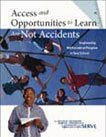
|
| As a companion to Turning Despondancy into Hope: Charting New Paths to Improve Students' Achievement and Participation in Science Education, the focus of this new SERC publication, written by Dr. William Tate, is largely devoted to how time can best be used to improve the teaching and learning of mathematics, and ultimately the performance of students on measures of mathematics achievement. |
| |
|
| Achieving Your Vision of Professional Development 2000 |
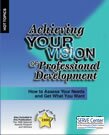
|
| Professional development programs and models tend to focus on the individual teacher as the key to school improvement, reform, restructuring, and the attainment of national goals for education including the number-one issue on most peoples mindsstudent achievement on standardized tests. Commitment to higher academic standards is strong both nationally and locally |
| |
|
| Advancing Reading Achievement: Becoming Effective Teachers of Reading through Collective Study 2001 |
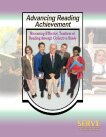
|
| This book provides the content and structure for a group study of reading and instructional practices that advance reading achievement. It includes concise summaries of research that reflect sound practices in reading instruction and the most current understanding of the process of reading. |
| |
|
| Analog to Digital Poster 2003 |

|
| This 11 X 17 poster identifies the equipment and process for transferring analog video to a digital format. |
| |
|
| Assessing Kindergarten Children: A Compendium of Assessment Instruments 2001 |
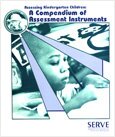
|
| This compendium reviews 60 assessment instruments to use with preschool and kindergarten-age children. Administration manuals from each of the instruments are reviewed. Each review explains the purpose of the instrument, how it is administered, and where it can be obtained. The compendium provides a "one stop" resource for information on early childhood assessment instruments. |
| |
|
| Assessing Kindergarten Children: What School Systems Need to Know 2001 |
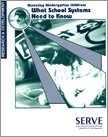
|
| This guide is designed for school district personnel and other early childhood administrators involved in designing large-scale assessment systems for kindergarten-age children. It presents research-based information on the best practices for assessing young children and describes a process that can be used when designing and implementing an assessment system. |
| |
|
| Assessing the State of State Assessments: Perspectives on Assessing Young Children 2003 |
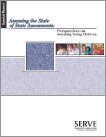
|
| This document includes a series of papers on theoretical and practical issues associated with wide-scale assessment systems that collect data from preschool- and kindergarten-age children. |
| |
|
| Chartering for Excellence: Developing and Implementing Charter School Legislation 1998 |
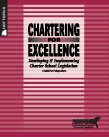
|
| The speed at which the charter school movement has swept the country has taken public policy analysts, educators, and many others by surprise. In the midst of this burgeoning process, however, two things often become lost in charter discussions: objectivity and a focus on the unintended consequences of charter school legislation. This publication explores charter-related issues, such as charter legislation, state agency staffing, charter applications, accountability and monitoring, racial balance, and funding, and includes a set of recommendations for policymakers and state education agencies. Appendices on numerous other charter school resources are included, as well as information on the status of charter schools within SERVE's region. |
| |
|
| Common Denominator, Volume 9, Number 1 Sept 2005 |
|
|
| |
|
| Community Colleges and K-12 Teacher Preparation 2000 |
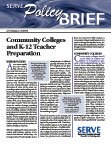
|
| Teacher quality is a national priority, and community colleges will continue to have an impact on the preparation of K-12 teachers. How effective that impact is depends on educators' and politicians' understanding of why and how that impact occurs and their willingness to provide leadership at all levels. This Policy Brief offers recommendations for how effective teacher preparation programs in community colleges can be a major factor in resolving the teacher shortage and teacher quality issue. |
| |
|
| Continuity in Early Childhood: A Framework for Home, School, and Community Linkages 2000 |
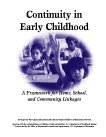
|
| This document is designed to support and facilitate the continuity of services for children, ages birth to eight, and their families. It is intended for use by communities that are attempting to develop comprehensive, integrated services. Also included is a guide for using the document to form these linkages among home, school, and community partners. |
| |
|
| Designing Teacher Evaluation Systems that Support Professional Growth 1997 |
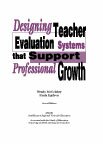
|
| This publication offers an overview of the benefits of and methods used in formative teacher evaluation. Meant for schools or districts interested in designing feedback systems that encourage improvement in teaching, the publication is based on SERVE's work with three school districts whose formative evaluations are described. Design questions are included to help schools initiate a formative system. |
| |
|
| Designing the School of Your Dreams 1998 |
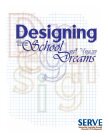
|
| Designing the School of Your Dreams is a SERVE Sharing Success publication created to broaden teachers', parents', administrators', and community leaders' visions of what a school can and should be. While visionary in its challenge to see beyond the walls of the traditional school to what is possible, this publication is also practical in its approach as it shares usable ideas and examples of successful implementations of those ideas. Designing the School of Your Dreams addresses school improvement at every level by encouraging its readers to envision the an ideal school and to actively pursue their high expectations and goals. |
| |
|
| Developing Leadership Programs for 2000 |
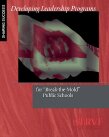
|
| This document, developed from the SERVE Leaders Institute experience, provides useful lessons to individuals and organizations interested in designing educational leadership programs. Primary audiences are state, local, and charter school officials, but designers of leadership development programs for a wide variety of institutions could benefit as well. |
| |
|
| Digital Video Poster 2003 |

|
| This 11 X 17 poster provides instructions for planning and preparing for filming, capturing footage, editing, and viewing the finished digital product. |
| |
|
| Dropping In (Volume 1, Number 1): A Brief Look at a Cross-Section of the Region's Dropout Prevention Programs 1999 |
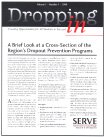
|
| This newsletter shares information and describes the successes of those in the region who are working diligently to reach students at risk for dropping out of school. The coordinators of the 11 dropout prevention programs described in this newsletter comprise the SERVE/USF-St. Petersburg (University of South Florida) Dropout Prevention Collaborative, which meets annually to discuss issues and policies associated with dropout prevention and to develop and critique products that will be disseminated throughout the region. |
| |
|
| English Language Learners in the Southeast: Research, Policy , & Practice 2004 |
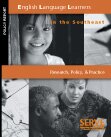
|
| This SERVE Policy Report provides a synthesis of carefully selected, rigorous research studies that yield policy-relevant findings about bilingual or English Language Learner (ELL) education programs. It also describes the current legislative and policy status of ELL education in the Southeast. Examples of various types of ELL education programs are provided, and implications for current education and policy reform in the SERVE states are also discussed. |
| |
|
| Experiential Learning for Pre-service Science and Mathematics Teachers: Applications to Secondary Classrooms 2002 |
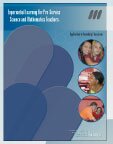
|
| This monograph, the fifth in the series, includes chapters written by teachers about their experiences conducting action research and/or scientific research. The writers in this monograph offer the field a significant view of what happens when pre-service teachers, practicing teachers, and practicing scientists work together as co-learners. These co-learning experiences create professional learning communities that stimulate change and growth for all of the learners. |
| |
|
| Family-Focused Workplace Guide 1999 |
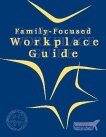
|
| The family has historically served as the foundation of society. The relationship between family and the workplace and the impact of both on school readiness are well-documented. Society, however, is changing, and home, work, and school relationships are being reassessed and retooled. The Family-Focused Workplace Guide is designed to assist businesses of all sizes and sectors in examining their current work/family policies and programs in the spirit of continuous improvement. |
| |
|
| From Policy to Practice: The Struggles, Strengths, and Successes of Exemplary Rural Schools in the Southeast 2004 |
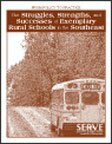
|
| This publication highlights exemplary rural schools in the six SERVE states of Alabama, Florida, Georgia, Mississippi, North Carolina, and South Carolina. A large portion of the school-age population in the SERVE region resides in rural areas, and this publication looks at some of the ways rural education is being improved. |
| |
|
| Georgia Goes Global! Monitoring the Global Environment through Authentic Science |
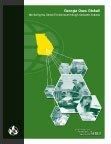
|
| This monograph depicts the experiences and learning from teachers who participated in Georgia Goes Global, a statewide initiative project developed by the State University of West Georgia Institute of Technology. The initiative was a partnership with the GLOBE Program, an international hands-on environmental project that unites students, educators, and scientists from around the world to study the global environment using the Internet. |
| |
|
| How to Assess Student Performance in Science: Going Beyond Multiple-Choice Tests 2000 |
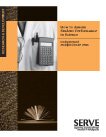
|
| This publication provides science teachers with practical information on ways to use alternative assessment models in the classroom. Clarification and examples of assessment methods, rubrics, and grading methods are provided. |
| |
|
| How to Help Children in Their School Life (Cómo ayudar a los niños en su vida escolar) Bookmark |
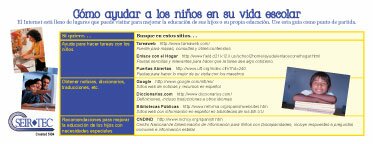
|
| This bookmark in Spanish provides a list of web sites for improving your children's education as well as your own education. |
| |
|
| Improving Basic Education for All Learners: The Role of Arts Education 1998 |
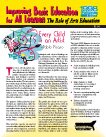
|
| This Policy Brief, undertaken in collaboration with the Southern Arts Federation, defines arts education as the teaching of four distinct subject areas--music, dance, theater arts, and visual arts--by certified arts educators. It suggests a mechanism to improve the performance of all students, particularly in the basics (reading, writing, and mathematics) and reports on selected research information in brain development. |
| |
|
| Improving Reading: Southeastern School Strategies 1998 |
|
| Improving Reading is part of a series of products designed to address the improvement of reading literacy in the Southeast. The series includes a video magazine on Leading Change in Literacy and a case study of two district-designed reading programs. Improving Reading is meant for educators who are committed to and excited about helping benchmark their school's efforts to improve reading. It summarizes what a team of SERVE colleagues learned from visits to 18 schools endorsed as having strong reading programs. The schools cited are listed so that you may personalize your benchmarking experience by contacting these schools and comparing progress notes on programs and reading improvement efforts. |
| |
|
| Improving Student Motivation: A Guide for Teachers and School Improvement Teams 2001 |
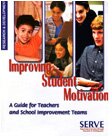
|
| This document presents a general overview of current research and thought on student motivation in classroom and school settings. It is designed as a resource to help teachers and school teams analyze the sources of students' motivational problems and consider changes that will improve motivation. |
| |
|
| Inside The Content: The Breadth and Depth of Early Learning Standards Executive Summary 2005 |
|
| This report details results from a content analysis conducted on 38 sets of early learning standards available for review in November 2003. The report provides an in-depth look at the areas of childrens learning and development that have and have not been addressed in early learning standards developed by states to define expectations for preschool-age children. |
| |
|
| Inside The Content: The Breadth and Depth of Early Learning Standards Full Report 2005 |
|
| This report details results from a content analysis conducted on 38 sets of early learning standards available for review in November 2003. The report provides an in-depth look at the areas of childrens learning and development that have and have not been addressed in early learning standards developed by states to define expectations for preschool-age children. |
| |
|
| Language, Discourse, & Learning in Science: Improving Professional Practice through Action Research 2000 |
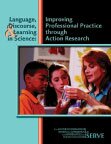
|
| This document is an assembly of 14 action research studies undertaken by practicing elementary and middle school science teachers enrolled in a science education distance learning graduate program at Florida State University. Several studies are presented on each of the following topics: conceptual change teaching and learning, learning through hands-on activities, and science discourse and language development. |
| |
|
| Leading Change in Literacy: Southeastern District Stories 1998 |
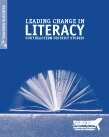
|
| Do you have students who do not know how to read and write and teachers who do not know how to "fix" them? Leading Change in Literacy consists of three parts. First, it describes how administrators, principals, and teachers in the Elizabeth City-Pasquotank County school district went about changing its reading program. Next, it depicts Surry County's experience with the Developing Efficient Readers program. Finally, to guide educators considering districtwide reading literacy improvement, Leading Change in Literacy presents the commonalities and differences of each approach and makes recommendations for district leaders. |
| |
|
| Leading Change in Principal Development: Notes for the Field 2003 |
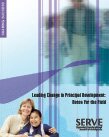
|
| Building from a partnership with a southeastern district, SERVE presents this publication as both a case report and a guide for those who design and deliver principal-development programs. The document describes the activities and outcomes of a unique theory-to-practice program, including chapters on design and management, participants, content and delivery, logistics, and evaluation. From schoolhouse to statehouse, anyone interested in "growing your own" school leadership program will find this practical guide invaluable. |
| |
|
| Lessons Learned: Factors Influencing the Effective Use of Technology for Teaching and Learning 2001 |
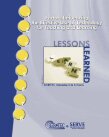
|
| In this second edition, SEIR*TEC staff shed some light on the factors that influence technology adoption by sharing some of the lessons learned and observations made while providing technical assistance and professional development to resource-poor schools across the region from 1995 to 2000. Additionally, suggested steps that educators might take in order to move their technology programs forward and a story from one of the SEIR*TEC intensive site schools accompany each lesson. |
| |
|
| Making Educational Web Sites and Software Accessible for Students with Disabilities Bookmark 2003 |
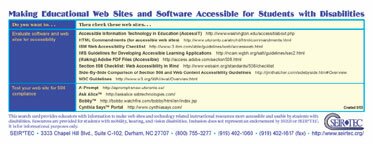
|
| This bookmark lists web sites that provide information on current research, services, products, tools, and resources designed to assist educators in meeting the learning needs of individuals with disabilities. |
| |
|
| Meaningful Science: Teachers Doing Inquiry + Teaching Science 1999 |
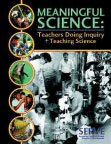
|
| This publication by The Southeast Eisenhower Regional Consortium for Mathematics & Science Education @ SERVE describes the experiences of classroom teachers involved in scientific research. |
| |
|
| Middle School Language Arts Web Sites Bookmark |
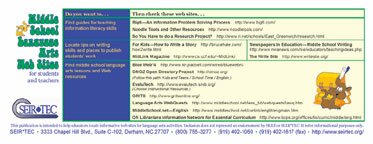
|
| This handy bookmark, developed by SEIR*TEC partner SREB, lists web sites where middle school educators can find standards-based language arts lessons and resources, assessment instruments, or topics to enhance teaching practices. The bookmark also includes topics that students can use. |
| |
|
| Middle School Mathematics Web Sites Bookmark |
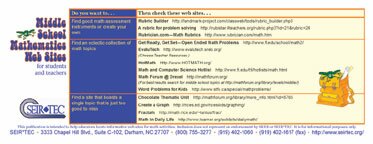
|
| This handy bookmark, developed by SEIR*TEC partner SREB, lists web sites where middle school educators can find standards-based math lessons and resources, assessment instruments, or topics to enhance teaching practices. The bookmark also includes topics that students can use. |
| |
|
| Middle School Social Studies Web Sites Bookmark |
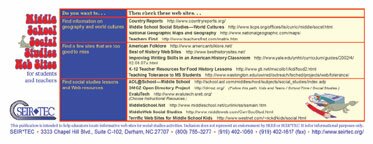
|
| This handy bookmark, developed by SEIR*TEC partner SREB, lists web sites where middle school educators can find standards-based social studies lessons and resources, assessment instruments, or topics to enhance teaching practices. The bookmark also includes topics that students can use. |
| |
|
| Milestones in Rural Education 1950-2000 2001 |
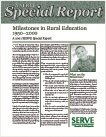
|
| This Special Report looks at significant changes in research perspectives and policy directions in rural education from 1950-2000. |
| |
|
| NewsWire: Reading and Technology (Volume 6, Number 1) 2003 |
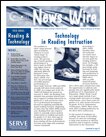
|
| This issue focuses on the roles in which technology can be used to help train teachers in effective practices and to improve reading instruction in the classroom. |
| |
|
| NewsWire: Evaluating Technology Initiatives (Volume 5, Number 3) 2002 |
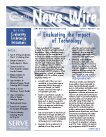
|
| In this issue, find steps to help in evaluating technology programs, explore questions to guide the evaluation process in schools, read about how some states and districts are setting up guidelines for measuring project results, and discover additional tools and resources for evaluating technology projects. |
| |
|
| Planning for School Improvement: A Report on a Comprehensive Planning Process 1997 |

|
| This report documents a process developed and used by SERVE to guide 12 districts in Georgia through the planning and development of a school improvement plan. The process is based on research that provides schools with the necessary tools to get started, stay focused, and achieve desired results. |
| |
|
| Planning into Practice: Resources for Planning, Implementing, and Integrating Instructional Technology 2000 |
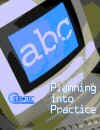
|
| Based on previous work with SEIR*TEC intensive sites, this document provides a variety of tools, examples, and stories useful in helping districts and schools plan, develop, and implement strategic educational technology plans. |
| |
|
| Ramping Up Reform: Aligning Education Rhetoric, Resolve, and Results 1999 |

|
| In a prior SERVE publication entitled, Going to Scale with TQM, SERVE described how one Florida district used training in TQM as a foundation for its reform efforts. Interestingly, over the last few years, leaders from Pinellas County have been sharing their experiences with a coalition of North Carolina educators, business leaders, and policymakers. To support educators in the Southeast in their pursuit of quality leadership and management, SERVE encouraged the North Carolina Total Quality in Education (TQE) Initiative to tell its story. Ramping Up Reform represents the reflections of those involved in the North Carolina Initiative, and it is intended for business and education leaders interested in exploring a model of how they work together to create "high-performing" educational organizations. |
| |
|
| Reducing School Violence: Building a Framework for School Safety 1999 |
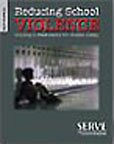
|
| This publication is designed to assist teachers, school principals, district administrators, resource officers, students, and parents in creating safe environments where learning is the primary focus. The content is a blend of usable research and successful practice. Exemplary efforts and programs at local, state, and national levels are highlighted, and methods for identifying and assessing school safety needsand developing positive responses to those needsare also provided. |
| |
|
| Reflecting on Progress: Site-Based Management and School Improvement in North Carolina 1998 |

|
| Phrases such as "site-based management," "shared decision making," "participatory governance," and "school-based management" are often used to refer to the process of decentralization in which schools find site-based solutions to site-based problems. This publication reports on survey data from local educators in North Carolina about the difficulties they faced in the early years of the state's legislation decentralization. Although the results are from one state, they mirror very closely the findings from national studies. |
| |
|
| School Readiness in North Carolina: Strategies for Defining, Measuring and Promoting Sucess for all Children 2000 |
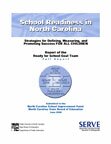
|
| As thousands of children enter school for the first time, parents, educators, and policymakers wonder: Are they ready? Have we given them the experiences and skills they need to be successful? At the same time, teachers, principals, and school boards ask, What attributes do these children bring with them to school, and how can we best meet their needs so they are successful throughout their school experience? These questions have no easy answers. Development occurs unevenly across groups and within individual children, experiences before children enter school vary greatly, and schools vary in their readiness to receive them. All of these factors impact childrens readiness for school. This is the report of the North Carolina School Improvement Panels Ready for School Goal Team, which was charged with the following responsibilities: 1. Develop a definition of school readiness that will help families, teachers, and communities support childrens optimal development and provide rich experiences to enhance the likelihood that each child will begin school ready and eager to succeed. 2. Identify assessment tools and processes that can be used to assess how well North Carolina is doing in preparing children for entering school. 3. Develop a definition of schools readiness for each child. North Carolina should ensure that its public kindergartens are prepared to teach every child who enters school, regardless of where the child might be in his/her own readiness for school. |
| |
|
| Science FEAT (Science For Early Adolescent Teachers) |
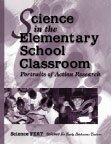
|
| These monographs consist of action research studies conducted and reported by elementary and middle school science teachers for Florida State University's Science FEAT program. |
| |
|
| Science Graduate Students in K-8 Classrooms: Experiences and Reflections September, 2005 |
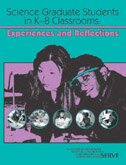
|
| This monograph features chapters written by participants in a National Science Foundation-funded Graduate Teaching Fellows Project at Florida State University (GK-12 Fellows). These chapters provide descriptive and analytical reflections on how highly qualified science graduate students and K-12 educators learned from each other in teaching K-12 students. |
| |
|
| Spreading Our Wings: An Examination of the Evolution of the Regional Educational Laboratory at SERVE 2001 |

|
| In 1991, a vision for school improvement and education reform throughout the Southeast was taking shape. The contract period for the federally funded Regional Educational Laboratories was almost at an end. Although the idea of winning a federal contract away from an incumbent lab was unprecedented, the strength of the new vision was inspiration enough to move forward. A group of people came together in the belief that a lab should--and could--do more for the multiple regional constituencies committed to school improvement. This document tells the story of the SouthEastern Regional Vision for Education (SERVE) and offers a case study examining how the Regional Educational Laboratory at SERVE came into being, how it evolved, what was learned over its first 10 years, and the challenges it faces in the years ahead. |
| |
|
| Standards for Preschool Children's Learning and Development: Who Has Standards, How Were They Developed, and How Are They Used? 2003 |

|
| Efforts to guide early care and education programs have primarily outlined standards for program operations and curricula rather than specific skills expected from children. Without national consensus on what young children should know and be able to do, numerous state agencies and organizations have developed their own descriptions of what preschool children should learn. This study was prompted by the absence of a national report or comprehensive source of data delineating how individual states are responding to the need for early learning standards. |
| |
|
| Teachers of the Year Speak Out: Key Issues in Teacher Professionalization 1993 |
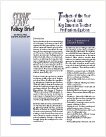
|
| SERVE wanted answers to such questions as, "What would help teachers be more effective?" and "What will it take to retain good teachers and attract the brightest young people to the teaching profession?" In an effort to answer these questions, in 1992, SERVE invited the 1992 and 1993 Teachers of the Year from Alabama, Florida, Georgia, Mississippi, North Carolina, and South Carolina to meet as an ongoing Advisory Council to our Laboratory. In this publication, the Council discusses what practices and programs are lacking in schools. They stress such things as the importance of increased teacher involvement, more collaboration among staff, better preservice education, and the implementation of mentoring/coaching programs and effective professional development programs. The Council also lists several detrimental practices they have observed in their schools, which have the potential to hinder effective teaching and learning. |
| |
|
| Teachers of the Year Speak Out: Tapping into Teacher Leadership 2001 |
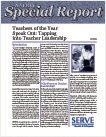
|
| Over a nine-year period, SERVE invited the current and past Teachers of the Year from Alabama, Florida, Georgia, Mississippi, North Carolina, and South Carolina to meet on a biennial basis to explore issues related to teacher leadership. This Special Report explains how teacher leaders can help guide colleagues to achieve higher standards of instruction and promote positive relationships between principals and teachers. |
| |
|
| The Vision Magazine (Volume 1, Number 1): Leaving No Child Behind: SERVE Helps Low-Performing Rural Schools Make the Grade 2002 |
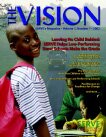
|
| This issue of The Vision focuses on the challenge of turning low-performing schools into high-performing learning communities that promote high student achievement. The issue includes articles on the challenges of rural education, serving the needs of homeless students, and an interview with Paul Berman on school reform. |
| |
|
| The Vision Magazine (Volume 1, Number 2): Using Assessment and Accountability to Improve Student Learning 2002 |
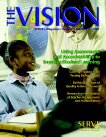
|
| This issue of The Vision examines emerging thinking about assessment systems that leads to improved instructional practices and looks at the challenges educators and policymakers face when designing such systems. The issue features articles on improving high-stakes state testing, defining standards for quality classroom practice, Florida's school accountability system, and testing requirements for No Child Left Behind. |
| |
|
| The Vision Magazine (Volume 2, Number 1): Creating Good Readers: Initiatives and Issues in Reading 2003 |
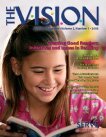
|
| This issue of The Vision focuses on reading initiatives in the SERVE states. It also includes an interview with administrators describing their states' programs and articles on issues in elementary school reading, Reading First and Early Reading First grants, and Reading Excellence Act information for the SERVE states. |
| |
|
| The Vision Magazine (Volume 2, Number 2): Advancing Learning Through New Leaders and Leadership 2003 |
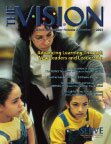
|
| This issue of The Vision looks at the role of leadership in educationwho leads, how they lead, how they are developed and supported, and how long they stay on the job. The issue includes articles on SERVE's work with three universities to improve classroom practice and student learning through action research, teaching standards, teacher evaluation, and the principal's role in developing quality teachers and improving student achievement. |
| |
|
| The Vision Magazine (Volume 3, Number 1): Making the Most of Out-of-School Time Through Expanded Learning Opportunities 2004 |
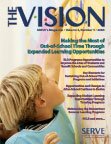
|
| This issue of The Vision examines various types of expanded learning opportunities programsprograms that operate outside the parameters of the typical school dayand how they can potentially boost student academic performance. Included in this issue are articles on different types of expanded learning opportunities programs, forming strong links to regular school-day programs, long-term sustainability of programs, and expanded learning opportunities under No Child Left Behind. |
| |
|
| The Vision Magazine (Volume 3, Number 2): Exploring the Challenges of High School 2004 |
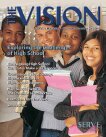
|
| This issue of The Vision examines aspects of high school reform. Articles included focus on policy and legislative initiatives supporting reform, how national foundations and associations are providing funding and resources to support efforts to re-envision high school, and specific strategies and programs being implemented in schools throughout the Southeast and the country. |
| |
|
| The Vision Magazine, Volume 4, No. 1, 2005 2005 |
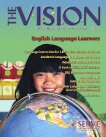
|
| SERVEs latest issue of The Vision focuses on the challenges facing English language learners, a complex group of students representing a wide variety of linguistic, cultural, and racial/ethnic backgrounds with diverse educational experiences. It is intended to be a quick-reference document featuring ELL awareness-level information. This edition of the magazine provides educators and policymakers with informative articles on ELL policy issues, instructional strategies, teacher preparation, references and other resources, and English language proficiency assessments. |
| |
|
| Turning Despondency into Hope: Charting New Paths to Improve Students Achievement and Participation in Science Education 2004 |
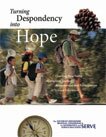
|
| This new monograph offers a realistic look at current trends in student achievement and the participation of underrepresented populations and the many factors that serve to sustain them. In addition, it offers new insights and concrete suggestions for change based on the analysis of recent reports and promising field-based studies. |
| |
|
|
|







